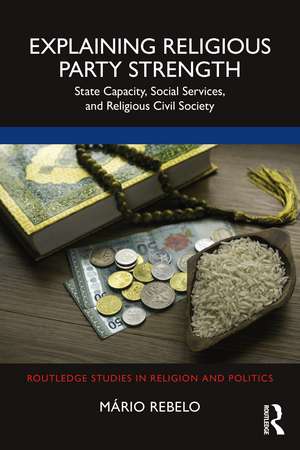Explaining Religious Party Strength: State Capacity, Social Services, and Religious Civil Society: Routledge Studies in Religion and Politics
Autor Mário Rebeloen Limba Engleză Paperback – 30 dec 2022
Drawing on insights from political science and sociology, this book argues that religious parties are typically formed for defensive reasons, reacting against state-builders’ attempts to secularize public services such as education, welfare, and healthcare. Building on these findings, the author argues that the strength of religious parties is determined by the infrastructural power of the state. Weak states that fail to provide adequate public services open up space for religious communities to build a dense network of private schools, hospitals, and charities, which translates into votes for religious political parties. By contrast, strong states that provide efficient public services squeeze out private welfare providers, undermining the electoral strength of religious political parties. The author tests this theory through statistical analysis, using a new dataset on all religious parties which have participated in national parliamentary elections between 1800 and 2015. He includes comparative historical analyses of Roman Catholic political parties in France and Italy and Sunni Islamic political parties in Egypt, Turkey, and Albania.
This book will interest students and scholars of religion and politics, specifically those interested in party formation, voting, and political activism, as well as policymakers.
Din seria Routledge Studies in Religion and Politics
-
 Preț: 304.05 lei
Preț: 304.05 lei -
 Preț: 281.87 lei
Preț: 281.87 lei - 18%
 Preț: 997.93 lei
Preț: 997.93 lei - 26%
 Preț: 763.97 lei
Preț: 763.97 lei -
 Preț: 356.44 lei
Preț: 356.44 lei - 13%
 Preț: 336.43 lei
Preț: 336.43 lei - 17%
 Preț: 259.98 lei
Preț: 259.98 lei - 16%
 Preț: 260.54 lei
Preț: 260.54 lei -
 Preț: 386.39 lei
Preț: 386.39 lei -
 Preț: 363.41 lei
Preț: 363.41 lei - 18%
 Preț: 1002.32 lei
Preț: 1002.32 lei -
 Preț: 353.57 lei
Preț: 353.57 lei -
 Preț: 389.66 lei
Preț: 389.66 lei - 43%
 Preț: 214.59 lei
Preț: 214.59 lei -
 Preț: 386.81 lei
Preț: 386.81 lei -
 Preț: 349.74 lei
Preț: 349.74 lei - 17%
 Preț: 259.98 lei
Preț: 259.98 lei - 18%
 Preț: 1114.40 lei
Preț: 1114.40 lei - 14%
 Preț: 336.90 lei
Preț: 336.90 lei -
 Preț: 378.92 lei
Preț: 378.92 lei - 26%
 Preț: 653.27 lei
Preț: 653.27 lei - 18%
 Preț: 1000.27 lei
Preț: 1000.27 lei -
 Preț: 389.38 lei
Preț: 389.38 lei -
 Preț: 391.61 lei
Preț: 391.61 lei -
 Preț: 384.59 lei
Preț: 384.59 lei -
 Preț: 389.11 lei
Preț: 389.11 lei - 19%
 Preț: 255.84 lei
Preț: 255.84 lei -
 Preț: 382.75 lei
Preț: 382.75 lei - 16%
 Preț: 243.53 lei
Preț: 243.53 lei - 26%
 Preț: 763.78 lei
Preț: 763.78 lei - 18%
 Preț: 1058.79 lei
Preț: 1058.79 lei - 26%
 Preț: 820.73 lei
Preț: 820.73 lei
Preț: 287.89 lei
Nou
Puncte Express: 432
Preț estimativ în valută:
55.09€ • 57.52$ • 45.59£
55.09€ • 57.52$ • 45.59£
Carte disponibilă
Livrare economică 15-29 martie
Livrare express 01-07 martie pentru 56.75 lei
Preluare comenzi: 021 569.72.76
Specificații
ISBN-13: 9781032328201
ISBN-10: 1032328207
Pagini: 266
Ilustrații: 9 Tables, black and white; 1 Line drawings, black and white; 43 Halftones, black and white; 44 Illustrations, black and white
Dimensiuni: 156 x 234 x 25 mm
Greutate: 1.08 kg
Ediția:1
Editura: Taylor & Francis
Colecția Routledge
Seria Routledge Studies in Religion and Politics
Locul publicării:Oxford, United Kingdom
ISBN-10: 1032328207
Pagini: 266
Ilustrații: 9 Tables, black and white; 1 Line drawings, black and white; 43 Halftones, black and white; 44 Illustrations, black and white
Dimensiuni: 156 x 234 x 25 mm
Greutate: 1.08 kg
Ediția:1
Editura: Taylor & Francis
Colecția Routledge
Seria Routledge Studies in Religion and Politics
Locul publicării:Oxford, United Kingdom
Notă biografică
Mário Rebelo holds a DPhil in Politics from the University of Oxford, UK. He is a data specialist at Macrobond. Previously, he taught courses on Comparative Politics and European Politics at the University of Oxford, as well as a Social Policy course on Stanford University’s UK campus.
Cuprins
1 Introduction 2 Religion and State Formation 3 Theorizing Religious Party Development 4 Quantitative Analysis of Religious Party Strength 5 Anticlerical State-Building in France and Italy 6 The Rise (and Fall) of Political Catholicism in Italy and France 7 Islam and Anticlerical State-Building in Twentieth-Century Egypt, Turkey, and Albania 8 Islam and Political Competition in Egypt, Turkey, and Albania 9 Conclusion
Descriere
Explaining Religious Party Strength explores why religious political parties are electorally successful in some countries but not in others.
